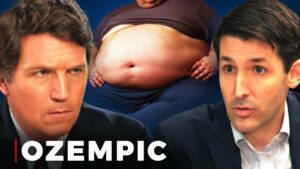In this video, Dr. Ekberg discusses the concept of „no carb“ foods and debunks some common misconceptions. He categorizes foods into three groups: foods with zero calories and zero carbs (such as water and herbal tea), foods with zero carbs or trace amounts (such as lemon water, meats, and fats), and foods with low carbs (such as eggs, nuts, leafy greens, and berries). He also addresses the carb content of condiments, sweeteners, herbs and spices, and other specific foods. Dr. Ekberg emphasizes the importance of portion sizes and individual goals when considering carb intake.

Our Summaries are written by our own AI Infrastructure, to save you time on your Health Journey!
Key Insights:
- There are no foods that have zero sugar and zero carbs, but there are foods with very low amounts of carbs that can be consumed in moderation.
- When looking at carb content, it’s important to consider the quantity of food being consumed.
- Foods with zero calories and zero carbs include water, apple cider vinegar, herb tea, green tea, black tea, coffee, and stevia.
- Foods with zero carbs or trace amounts include lemon water, meats (such as lamb, fish, and chicken), fats (such as olive oil, coconut oil, and butter), mayo (depending on the quality of the oil used), and low-carb vegetables (such as leafy greens, olives, mushrooms, and zucchini).
- Foods with low carbs include eggs, cheese, avocado, nuts (such as macadamia nuts, pecans, and walnuts), seeds (such as flax, chia, hemp, and pumpkin), and non-starchy vegetables (such as spaghetti squash, broccoli, Brussels sprouts, and bell peppers).
- Some foods have a varying amount of carbs depending on the quantity consumed, including coconut cream, dairy products (such as milk, cream, and half-and-half), condiments (such as mustard and ketchup), coconut water, sweeteners (such as stevia and sugar alcohols), fruits (such as berries and watermelon), garlic, herbs and spices, and glucomannan (for thickening sauces).
- Understanding the dose and the individual’s carb budget is essential when considering these foods.
- It’s important to choose from a wide variety of foods and not rely on one specific food with low carbs.
Transcript
In this video, the speaker discusses the concept of zero-carb and zero-sugar foods. They begin by explaining that the idea of zero-carb or zero-sugar foods depends on individual goals. They mention that there is a lot of misinformation regarding this topic and aim to provide a comprehensive understanding.
The speaker mentions a video they watched titled „no sugar no carb foods“ which contained a lot of misinformation. They argue that the video did not mention certain low-carb foods like butter and salmon, and included foods like kale, pecans, watermelon, cauliflower, and blackberries, which were falsely claimed to have zero sugar and zero carbs.
To clarify, the speaker provides net carb percentages for different food categories. They divide foods into four categories: zero-calorie foods, zero-carb or trace amount foods, low-carb foods, and foods in a category that depends on quantity.
In the zero-calorie foods category, the speaker mentions water, apple cider vinegar, and herb tea as safe options that won’t affect factors like fasting, calorie reduction, or insulin levels. They advise caution with green tea, black tea, and coffee, as caffeine may affect some individuals‘ stress levels or insulin response. Lastly, they mention stevia and monk fruit extract as zero-calorie sweeteners but note that their impact may vary depending on the individual.
Moving on to zero-carb or trace amount foods, the speaker discusses options such as lemon water, infused water, proteins like meat, fish, and chicken, fats like olive oil and coconut oil, mayo (depending on the quality), and various nuts like macadamia nuts, pecans, and walnuts.
In the low-carb category, the speaker suggests including eggs, cheese, avocados, various nuts with more carbs like peanuts and cashews (in moderation), seeds like flax, chia, hemp, and pumpkin, leafy greens like Swiss chard, kale, spinach, and lettuce, olives, non-starchy vegetables like broccoli, bell pepper, and zucchini, and fermented foods like sauerkraut.
For foods that depend on quantity, the speaker addresses condiments like mustard and ketchup, coconut milk for drinking, Worcestershire sauce, stevia and other sweeteners, fruit like berries and watermelon, nutritional yeast, garlic, and herbs and spices. They emphasize that the impact of foods in this category depends on the amount consumed.
Lastly, the speaker discusses glucomannan, a fiber-rich gelatinous substance often used for thickening sauces. They suggest using glucomannan instead of starch-based thickeners like cornstarch, as it has zero carbs and is all fiber.
The video concludes by encouraging viewers to ask questions and share their comments. They remind viewers to subscribe to their channel for more information on topics like insulin resistance and fasting.





